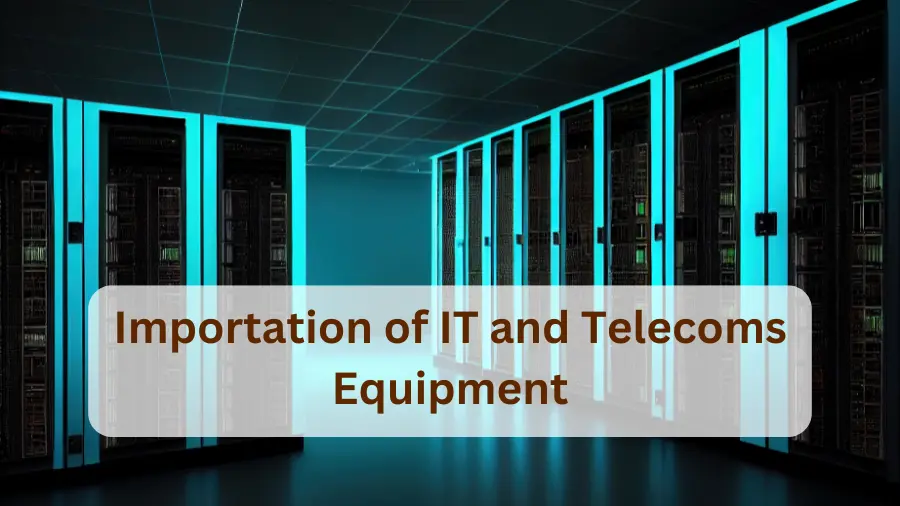Importing IT and telecom hardware is far more complex than moving goods across borders. Every country enforces strict certifications, safety standards, and customs controls before shipments are released. From securing telecom type approval to registering with tax authorities, businesses must follow detailed processes to avoid costly delays.
Whether you’re importing servers into Kenya, telecom routers into Nigeria, or networking gear into Saudi Arabia, this guide explains the key compliance steps, documents, and country-specific requirements for smooth operations.
Why Compliance Matters in IT & Telecom Imports?
Telecom and IT equipment connect directly to national communication networks. Governments enforce type approvals, safety checks, and customs regulations to:
-
Protect public safety and data security
-
Ensure compatibility with local telecom infrastructure
-
Collect duties, VAT, and other import taxes
-
Control unauthorized distribution of restricted equipment
Failing to comply can mean shipment seizures, penalties, or permanent bans on your business from importing in certain countries.
Core Compliance Requirements for IT & Telecom Imports
Before telecom and IT equipment can enter most markets, importers must meet three core compliance obligations:
Telecom Type Approval
Type approval is mandatory to prove telecom and IT devices comply with national technical and safety standards. Regulators test equipment for compatibility with local networks and ensure it does not interfere with critical infrastructure.
- Saudi Arabia – The Communications & Information Technology Commission (CITC) requires a Certificate of Conformity (CoC) issued via the SABER platform.
- Nigeria – The Nigerian Communications Commission (NCC) must approve telecom devices before they are placed on the market.
- Kenya – The Communications Authority of Kenya (CAK) enforces compliance for ICT hardware and networking equipment.
- South Africa – The Independent Communications Authority of South Africa (ICASA) oversees licensing and technical approvals for telecom devices.
- Egypt – The National Telecommunications Regulatory Authority (NTRA) manages type approval and conformity assessment for telecom imports.
- Morocco – The Agence Nationale de Réglementation des Télécommunications (ANRT) requires testing and certification before market entry.
Importer Registration
Many countries require companies to hold a government-issued importer or distributor license. This step ensures only authorized businesses can bring telecom hardware into the market and prevents unauthorized or non-compliant devices from entering national networks.
Tax Registration
Importers must also register with national tax authorities to comply with VAT, GST, or customs duties. For telecom shipments, this is especially important because high-value networking equipment often attracts elevated import duties. A valid tax registration certificate speeds up clearance and prevents fines.
Essential Import Documents for IT & Telecom Equipment
To clear shipments, customs authorities usually require:
- Import License – authorization to bring in telecom/IT devices
- Technical Standards Compliance Certificate – safety and performance proof
- Commercial Invoice – itemized value for customs duties and taxes
- Packing List – shipment details for customs verification
- Bill of Lading / Air Waybill – proof of shipment and transport contract
Additional Procedures & Country-Specific Notes
- Customs Declaration – required in all markets to classify goods and assess duties.
- Dangerous Goods Declaration (if applicable) – only needed if importing telecom devices with built-in batteries (e.g., routers with lithium-ion backup modules) or other hazardous components.
- End-User Registration – In Saudi Arabia, end users must register telecom devices with CITC before operation.
- Inspection Certificates – sometimes required to verify safety or compliance before release.
Cost, Timeline & Risk Considerations
- Approval timelines – Type approval and conformity assessments typically take 2–8 weeks, depending on the product category. Restricted items such as encryption tools, satellite devices, or drones may require longer.
- Costs – Fees vary by country but include approval charges, VAT/duties, and handling costs.
- Risks – Delays can lead to demurrage charges, warehousing fees, and missed project deadlines. Proactive planning reduces both cost and risk exposure.
Simplify IT & Telecom Imports with IOR Africa
Importing telecom hardware into Africa and the Middle East requires precise compliance — one missing document can stall an entire shipment.
At IOR Africa, we specialize in:
-
Securing telecom type approvals and certifications
-
Managing customs clearance and HS code validation
-
Ensuring VAT and tax compliance across multiple markets
-
Reducing shipment risks with proactive trade expertise
Contact IOR Africa Now to streamline your IT and telecom imports.

